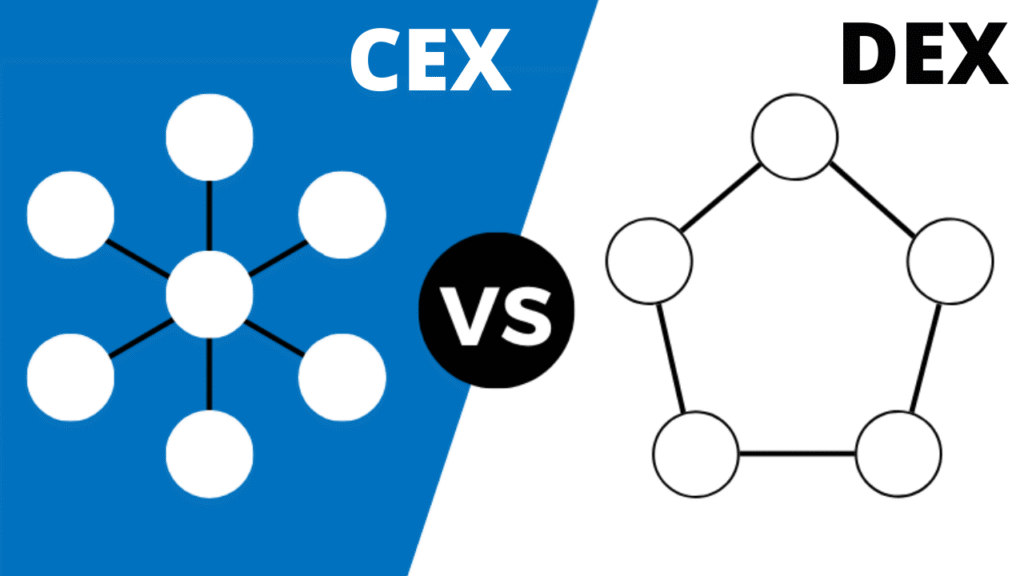As the pace of crypto adoption increases, the accompanying infrastructure grows as well. One of the most visible aspects of that growth is the rise in the number of crypto exchanges. Everybody needs a place to buy and sell crypto, from newcomers to seasoned investors. However, not all crypto exchanges are equal.
One of the choices users must make is between a centralized exchange (CEX) and a decentralized exchange (DEX). There are many practical differences that dictate this choice, but for many users, it is a choice between two philosophies, each with a distinctive set of values.
On the surface, both offer the same basic function, allowing users to trade cryptocurrencies. But if you look under the hood, you will find a whole slew of differences on both philosophical and practical levels.

What is a Centralized Exchange (CEX)?
A centralized exchange is a trading platform run by a company or organization. These platforms, like Binance, Coinbase, and Kraken, act as intermediaries by holding your assets and processing your trades. They offer a user-friendly interface with a sleek UI, easy onboarding with fiat currencies, and 24/7 customer support. They also tend to have high liquidity, allowing fast order execution.
The downside is that CEX platforms use centralized custody, meaning users have to surrender control of their assets and private keys to a third party. This seriously undermines security and opens them to hacking attacks, like the one that crippled Bybit in February. Centralized exchanges also must comply with regulatory legislation, and their users often need to complete KYC (Know Your Customer) verification, trading privacy for convenience.
What is a Decentralized Exchange (DEX)?
A decentralized exchange offers crypto peer-to-peer trading, bypassing an intermediary. Trades happen on-chain, powered by smart contracts. DEXs like Uniswap, SushiSwap, and PancakeSwap run on public blockchains such as Ethereum and BNB Chain.
Since there is no centralized custody, users retain control of private keys and assets. DEX platforms rarely, if ever, require KYC procedures and often offer a wide choice of tokens. If you are looking to buy some exotic or niche crypto, DEX is often your only choice.
In the early days, UI on DEX platforms was cobbled together and often confusing for ordinary users. Although that is changing fast, liquidity remains an issue, especially for small-cap tokens. If you are trying to offload one of those, it may take a while to execute your order.
User Experience: CEX is Easier, but DEX is Catching Up
CEX platforms are more convenient to use than DEX by an order of magnitude. They offer a plug-and-play solution: sign up, deposit funds, start trading. Their simplicity is almost irresistible, especially for new users.
However, DEX platforms are evolving rapidly and catching up. The gap in trade volume, although still significant, is shrinking rapidly. In January 2024, DEX volumes were 9.37% of total spot trading volume. Just one year later, by January 2025, this percentage rose to almost 16%.
Security
From a security standpoint, both CEX and DEX platforms have their advantages and disadvantages. CEX offers robust security solutions, including cold storage and insurance funds. On the other hand, the ownership of private keys can be troublesome. Surrendering your keys to someone else opens up a whole different can of worms.
With DEX, the situation is reversed. You trade directly from your wallet, eliminating the middleman entirely. Miners will find this familiar, as most crypto mining apps use similar solutions. On the other hand, you are solely responsible for security, keeping your private keys safe, understanding gas fees, and avoiding phishing scams. The issue is that most ordinary users simply lack the expertise and can’t provide even a portion of the security that big exchanges can.
Conclusion
When making the choice between a DEX and a CEX, it is important to remember that it isn’t about which is better—it’s about which is better for you. If you are a beginner, we would recommend sticking with centralized exchanges. Once you have learned the ropes, you may consider switching to decentralized solutions, as they offer more flexibility for advanced users. In both cases, make sure you understand the risks before making the decisions.

